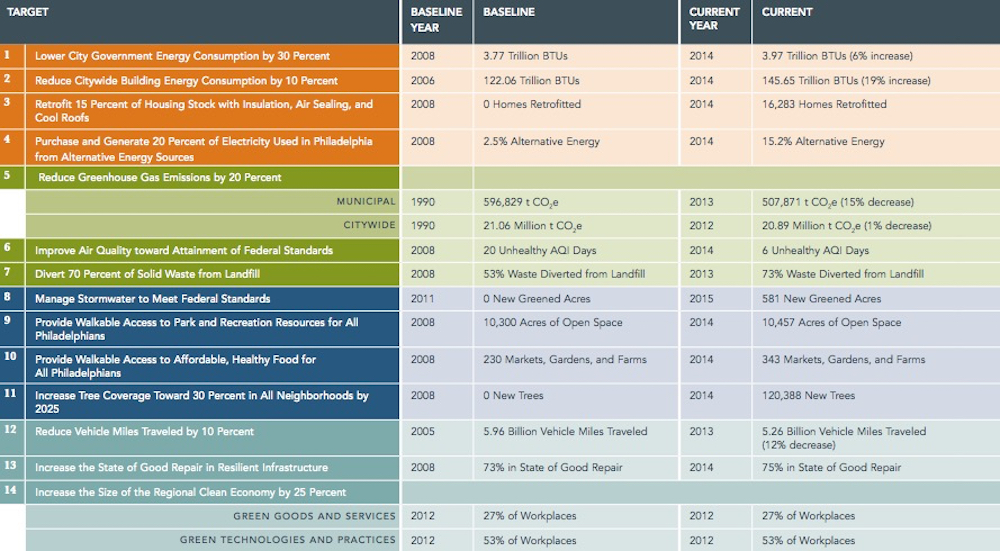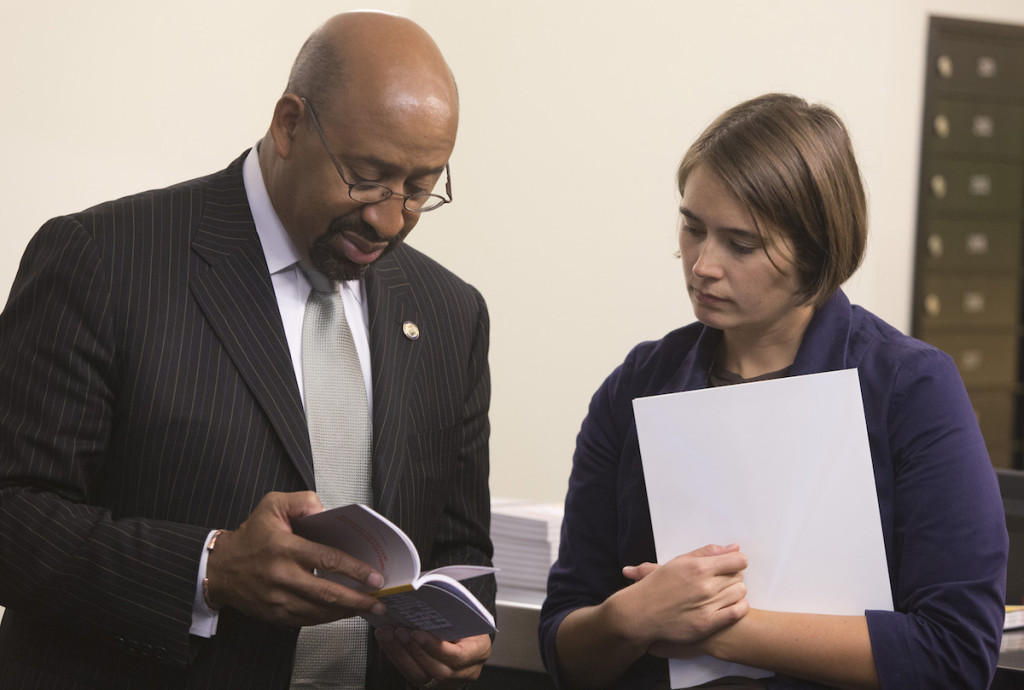Moving On: Office of Sustainability Director Katherine Gajewski
 January 18, 2016
Category: Featured, People
January 18, 2016
Category: Featured, People
Moving On is a series of Q&As with social impact leaders who are leaving their organizations for new opportunities. Here, they will share what they learned and where they’re headed.
Here’s some good sustainability news for Philadelphia: In 2014, 15.2 percent of electricity used in the city came from alternative energy sources, up from two and a half percent in 2008.
And now, for some less-good news: That number was supposed to be higher. The city had aimed for 20 percent of its electricity to come from alternative energy sources in the same timeframe.
We may have missed our mark by a few percentage points, but the fact that we have those numbers at all is due to the Mayor’s Office of Sustainability, the city department that’s responsible for ensuring that Philadelphia becomes the greenest city in America, per former Mayor Michael Nutter‘s pledge.
At the helm of that office was Katherine Gajewski, who served two four-year terms with the City of Philadelphia — six years as director, and two years as an aide. Last week, she began her new work with City Scale, a national initiative that aims to identify gaps in urban sustainability opportunities.
Generocity Editor Julie Zeglen spoke with her about how the city’s sustainability landscape has changed over the past eight years and her new work with City Scale. Their conversation has been edited for length.
Generocity: Can you first describe what you did as the director of the Mayor’s Office of Sustainability?
Katherine Gajewski: It evolved over my time in the position, as both the office grew and then the range and depth of the issues we worked on changed. But in general, I led the office and managed a team of about 10 staff, and together we were in charge of coordinating the implementation of Greenworks Philadelphia, which is the city’s comprehensive sustainability plan.
G: Can you talk about the scale of that, and the goals?
KG: When Mayor Nutter took office, there was a lot of stakeholder interest in paying the city to take on sustainability, and he made the major commitment to make sustainability a priority. There was some infrastructure in place to support that kind of work, but it was a little bit more ad hoc. Greenworks was an attempt to work comprehensively across the range of issues that encompass sustainability and across the range of departments and agencies in city government.
Greenworks encompasses initiatives related to energy, open space, stormwater management, food access, open space access, mobility, so on and so forth. We took a really broad look at sustainability and set 15 goals and then committed to undertaking around 160 various initiatives.
G: What are some direct results of the initiative?
KG: One goal was focused around reducing municipal government’s energy use. Eight years ago, there was not a very sophisticated energy management program in place, and by setting that goal as part of Greenworks, we realized we needed to be tracking and using data entirely differently. We needed to be thinking about the city’s buildings in whole new ways and considering opportunities to retrofit buildings that were using [more than] their fair share of energy. So, that goal led to the development of an energy office and a really sophisticated energy program that we built up over the course of six or seven years.
And then, because of that focus and that commitment, last year we recorded a 15 percent energy reduction.
G: What is the work that still needs to be done in the city, in terms of sustainability?
KG: I really think of Greenworks as Gen One. By putting the plan out there, we started to think about sustainability and a city’s role in advancing some of these priorities in a whole new way. In some cases [we had to be] getting baseline data that didn’t even exist so that we could understand where we were starting from and measure the progress that we had made along the way. I think the past six years were a lot about putting that foundation in place and building up knowledge, and from there we were able to more quickly advance initiatives and identify opportunities that could help us to reach a goal.
Where I see the next generation of work going or needing to go is really in thinking about questions of scale. So, the kind of impacts that we want and need to have — for example, around greenhouse gas mitigation, and equity issues around access to resources — these are really big questions that are going to require fundamentally new ways of thinking in making this vision and investing.
G: What is the transition like for the new team for the mayoral administration, and what are some of the challenges and benefits of having a new mayoral administration? Is it disruptive to the work that’s been going on, or is it exciting as well because there’s new energy?
KG: Yeah, I generally think that transitions are really healthy. It’s great to have new energy and new ideas and new perspectives come in, and certainly in the first year, two years of a new mayoral administration when they’re really trying to figure out what their agenda is, all ideas are on the table, and I think that encourages big thinking and fresh ideas that are really healthy and helpful.
Transitions are especially great when there’s a high level of coordination between the outgoing administration and the incoming administration, which there really was in the Nutter-Kenney transition process. And Mayor Kenney kept on the bulk of Nutter administration officials, so there’s a lot of continuity of knowledge, but there’s also a new agenda and some new energy.
G: Now you’re moving onto a national initiative called City Scale, and that’s a national initiative. Can you share a bit about what that is?
KG: Even though I’m relatively young, I’m one of the old-timers in the emerging urban sustainability field. The field really started to take off around 10 years ago, and when I was director of sustainability, I was also the co-chair of the Urban Sustainability Directors Network, which is a peer-to-peer network of practitioners working in cities across the United States. That gave me a whole new perspective and level of exposure to issues that cross over multiple cities, to the role of cities in advancing climate work, transportation, etc.
[At USDN], my colleagues started to come up with a lot of ideas, to see a lot of gaps that needed filling, to see a lot of opportunities that weren’t being designed to get the fullest impact. City Scale is about working to start to identify what those gaps in opportunities are in the urban sustainability field and to also be enhancing the connection between cities and the work happening in cities, and then the other sectors that are invested in sustainability, from philanthropy to investors to nonprofits to companies.
We have foundation funding to spend time this year doing research and planning to really take a step back [and] assess the urban sustainability field in the United States.
G: What would some direct results on the initiative be? What does it mean for Philly?
Cities are a marketplace and a priority, but yet, a lot of the entities that are working in and around cities don’t really understand each other, know how to talk to each other, have a natural convening point. So we see City Scale as playing a role as a broker for some certain projects, an intermediary that can work alongside those partners to understand what their needs are and what the barriers are and then to help make connections that can resolve some of those issues, then bring about either better or new programs and projects.
G: Will you still be based in Philly as you’re doing this work?
KG: Yeah, I will be! And that was a goal of mine, to try to figure out how to pivot toward national-scale work, but to be able to do it from Philadelphia.
I think that there is such a strong base of support in Philadelphia for this work that we take for granted. It doesn’t exist in every other city in the country by any means. So, I think there’s a special combination of factors in place in Philadelphia, and a lot of challenges, obviously, but I really think that the foundation is there, and the opportunities are rich to be doing some really interesting, innovative work over the coming years. I encourage everyone to be engaged and to keep an eye on what’s to come.
Project
Moving OnTrending News











